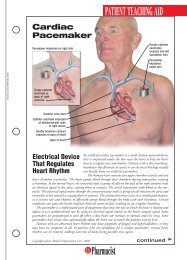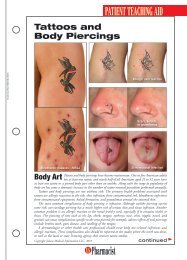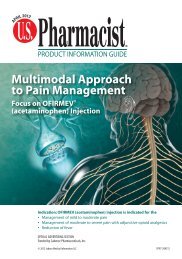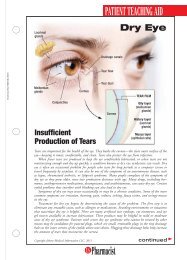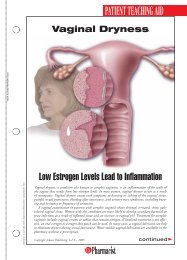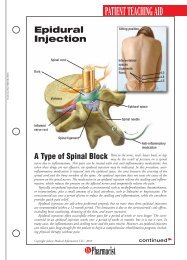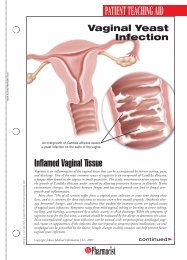View PDF Edition - U.S. Pharmacist
View PDF Edition - U.S. Pharmacist
View PDF Edition - U.S. Pharmacist
You also want an ePaper? Increase the reach of your titles
YUMPU automatically turns print PDFs into web optimized ePapers that Google loves.
NUTRITION AND CLINICAL DEPRESSIONTable 3Effects of Vitamins and Minerals on DepressionVitamin Bs• Vitamin B 1(thiamine): Deficiencies trigger depression and irritability andcan cause neurologic and cardiac disorders among alcoholics.• Vitamin B 2(riboflavin): Adequate riboflavin may be required for cognitivefunction. Riboflavin has been reported to improve depression scores inpatients taking TCA drugs.• Vitamin B 3(niacin): Depletion causes anxiety, depression, apprehension,and fatigue.• Vitamin B 5(pantothenic acid): Symptoms of deficiency are fatigue, chronicstress, and depression. Vitamin B 5is needed for hormone formation andfor the uptake of amino acids and the brain chemical acetylcholine, whichcombine to prevent certain types of depression.• Vitamin B 6(pyridoxine): Deficiency can disrupt formation of neurotransmitters.Vitamin B 6is a coenzyme needed for conversion of tryptophan toserotonin and of phenylalanine and tyrosine to norepinephrine.• Folic acid (B 9): Folate and MTHF work best together by helping to regulatethe neurotransmitters that affect depression.• Vitamin B 12: This vitamin controls blood levels of the amino acid homocysteine.Elevated levels of this substance appear to be linked with heart diseaseand, possibly, depression and Alzheimer’s disease.Vitamin CContinued vitamin C deficiency causes chronic depression, fatigue, and vagueill health.MineralsDeficiencies in a number of minerals can also cause mental problems.• Calcium: Depletion affects the central nervous system. Low levels of calciumcause nervousness, apprehension, irritability, and numbness.• Zinc: Deficiencies result in lack of appetite and lethargy. When zinc is low,copper in the body can increase to toxic levels, resulting in paranoia andfearfulness. Zinc also protects the brain cells against the potential damagecaused by free radicals.• Iron: Depression is often a symptom of chronic iron deficiency. Othersymptoms include general weakness, exhaustion, lack of appetite, andheadaches.• Manganese: This metal is needed for proper use of the B-complex vitaminsand vitamin C. Since it also plays a role in amino acid formation, a deficiencymay contribute to depression resulting from low levels of the neurotransmittersserotonin and norepinephrine. Manganese also helps stabilizeblood sugar and prevent hypoglycemic mood swings.• Potassium: Depletion is frequently associated with depression, tearfulness,weakness, and fatigue. A 1981 study found that depressed patients weremore likely than controls to have decreased intracellular potassium.Decreased brain levels of potassium have also been found on autopsy ofsuicides. Potassium levels can be boosted by using one teaspoon of Morton’sLite-Salt every day.• Magnesium: Symptoms of deficiency include confusion, apathy, loss ofappetite, weakness, and insomnia.• Selenium: Low selenium intake is associated with lowered mood status.Intervention studies with selenium with other patient populations revealthat selenium improves mood and diminishes anxiety.MTHF: methyltetrahydrofolate; TCA: tricyclic antidepressant.Source: References 11-14.Proteins and Amino AcidsMany of the neurotransmitters inthe brain are made from aminoacids. Proteins are made up ofamino acids and are importantbuilding blocks of life. As manyas 12 amino acids are manufacturedin the body and theremaining eight (essential aminoacids) must be supplied throughdiet. A high-quality protein dietcontains all of the essential aminoacids. Foods rich in high-qualityprotein include meat, milk andother dairy products, and eggs.Plant proteins in beans, peas, andgrains may be low in one or twoessential amino acids.Protein intake and in turn theindividual amino acids can affectthe brain function and mentalhealth. The neurotransmitterdopamine is made from theamino acid tyrosine, and the neurotransmitterserotonin is madefrom tryptophan. If there is alack of either of these aminoacids, there will lack of neurotransmittersynthesis, which isassociated with low mood andaggression in patients. The excessivebuildup of amino acids mayalso lead to brain damage andmental retardation. For example,excessive amounts of phenylalaninein individuals with the diseasecalled phenylketonuria cancause brain damage and mentalretardation. 10Omega-3 Fatty AcidsThe brain is one of the organswith the highest level of lipids(fats). Brain lipids are composedof fatty acids and are a majorpart of its membranes. It hasbeen estimated that gray mattercontains 50% fatty acids that arepolyunsaturated in nature (about33% belong to the omega-3 family)and hence are suppliedthrough the diet. In one of thefirst experimental demonstrationsof the effect of nutrients on thestructure and function of theHEALTH SYSTEMS EDITIONHS-33U.S. <strong>Pharmacist</strong> • November 2009 • www.uspharmacist.com



